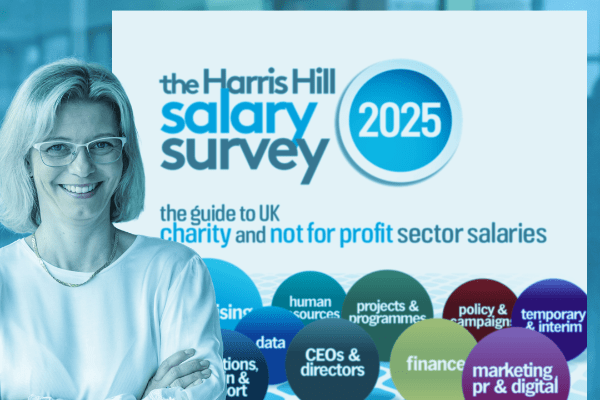Appointing the right (or wrong) CEO can have a huge impact, so how do you identify the right person? Jenny Hills of Harris Hill Executive Search has helped many charities with this decision and shares some expert advice on the questions to ask.

The challenges of choosing a CEO
One of the biggest decisions a board of trustees can make is who to appoint as CEO of their charity. Hopefully, it is also a decision they rarely have to make (and given the new breed of charity CEOs who see roles as discrete projects, how often is too often is a question for another day).
However, there is a potential lack of experience on boards in recruiting at this level. In our experience, this means that it can be difficult for trustees to pinpoint what criteria they are looking for in the recruitment process, the profile of their ideal new CEO, and how to identify the required experience in candidates. Luckily, these are all areas where Harris Hill can provide a wealth of expertise.
For shortlisted candidates, trustees generally have the following from each applicant to make their decision based on:
- A CV
- A covering letter or supporting statement
- Commentary from the executive search consultant the board has partnered with on their interview and other interactions with the candidate
- A one or two stage interview process
Following this, trustees are expected to make a decision about who is going to lead an organisation. The right CEO can transform a charity and take it to new heights. The wrong CEO can be a disaster.

So how do you start to identify the right candidates?
The interview process is absolutely key, as it provides the in-person interaction that determines if the candidate is someone the board can see themselves working with, but how do you make sure you are getting someone who will perform as CEO, rather than someone who simply interviews well? Will they walk the walk? Can they do more than just talk a good game?
It is absolutely possible and indeed strongly advisable to build in exercises to the interview process that will broaden the assessment of candidates, such as asking them to give a presentation on a pre-provided topic, meeting key staff members, and completing a written exercise. These can demonstrate how a candidate would perform in the role - are they a strong public speaker who can represent the charity? Can they write an incisive, focused commentary on monthly expenditure accounts for the board? Is there going to be a massive personality clash with the Deputy CEO?
But it is the formal panel interview that is the opportunity to really dig into a candidate's experience and their interest in the role. It is crucial to ask questions that will do just this.

The importance of competency based questions
We recommend that our clients run competency based interviews that assess candidates' fit with the job description and/or person specification, and ultimately the strategic goals of the charity, with questions that encourage concrete examples of how candidates' experience is relevant.
For example, imagine that you were the chair of a charity that needed a CEO to build and develop relationships with high net worth individuals to bring in major donations. This is key for your charity's strategy. You would want someone who had a demonstrable track record of success in this area and the personality of an advocate.
Now for the questions. Take this one:
'How would you increase funding from major donors?'
Having worked as a consultant with a number of people who have track records in doing just that, I know a fair amount about major donor fundraising, and could put together what would sound like a convincing answer to that question, especially if the interviewers themselves are not familiar with the area. There's just one problem - I've never brought in a major donation in my life!
But what if an interviewer for this role asks me, an unqualified candidate but who knows my way around an interview, this version of the question?
'Can you give me an example of increasing funding from major donors at an organisation?'
Now the truth comes out, because I can't. A good candidate will provide a relevant example. A great candidate will put the example they're about to give in context; explain what they did, how and why; and quantify the success.
Of course, a great candidate will most likely answer the first question by referring to their previous experience. But the format of the question gives people without such experience much more room to hide than the latter.

Use follow-up questions to check personal involvement
The precise language used by a candidate can be highly illuminating. If they mention that "we did this" or "our strategy was", etc., it can be worth following up with questions to probe the extent of their personal involvement in the project they're describing. Did they lead it single-handedly, work with a team or even were they a relatively minor player?
Such questions can be deepened by also asking how they would translate that experience to your charity: 'Can you give me an example of increasing funding from major donors at an organisation, and what have you learnt from this experience that you could bring to this role?'
This style of questioning can also be turned towards investigating a candidate's personal qualities. Some examples:
- 'How have you demonstrated emotional resilience in a challenging situation at work?'
- 'What examples can you provide that show your alignment with the mission and values of this charity?'
- 'Tell us about a time you resolved conflict in a professional environment.'
A bank of similarly structured questions over the course of an interview will provide a set of tangible examples of how a candidate's overall profile fits with the role, which - critically - can be assessed alongside other candidates' responses to the same question.

Fair and objective analysis
Another strong advantage of the competency-based interview is that by asking each candidate the same question, you ensure that the process is as fair and objective as possible - every candidate gets the same chance to shine.
These advantages are why we at Harris Hill systematically follow the competency-based structure when we interview candidates for roles, and encourage our clients to do the same: we believe our track record of great candidate and charity matches speaks for its success.
Jenny Hills, Harris Hill Executive Search
If you have any queries on how my colleagues on the Executive team and I can support your senior recruitment process, please do contact me on 020 7820 7321 or at jenny.hills@harrishill.co.uk
| |

-

Opportunity for all
Find out how we’re working to deliver more diverse, equitable and inclusive recruitment…
-

Recruiting a charity CEO?
Our executive recruitment specialists have an exceptional record of successful CEO, chair, trustee and…
-

Charity sector salaries
Our 2025 Salary Survey has the latest rates and expert insight for roles throughout the sector.













